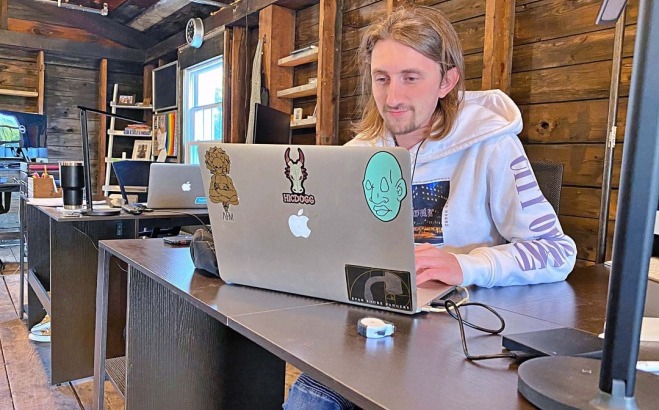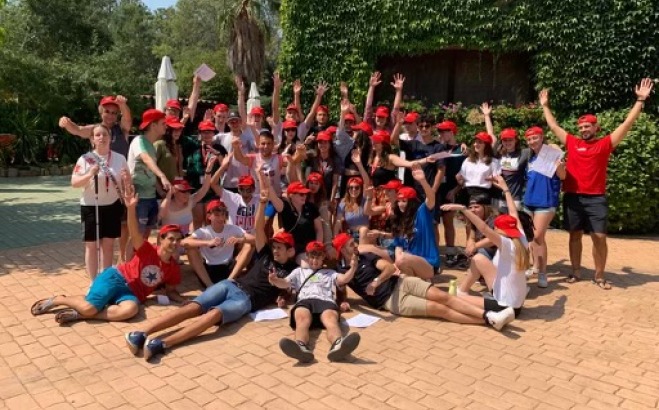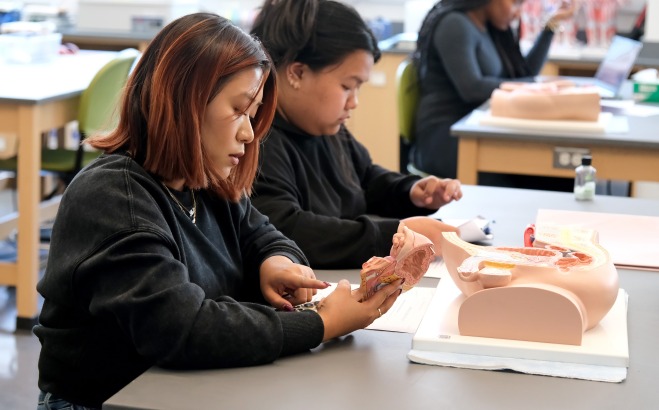
In Short
The Biology major offers a bachelor of arts or science with core biology courses including student laboratory work so that you'll develop the skills of scientific inquiry. You'll develop scientific literacy through reading, writing, testing hypotheses, and quantitative analysis.
Biology is the study of life, in all its forms and contexts. To quote E.O. Wilson, biology is itself "living, changing, evolving." The program in biology emulates this view by teaching foundational principles and exploring contemporary thinking about the nature of life. All students follow a general program of study through a sequence of core courses, electives and a capstone course. In the capstone course, students apply their understanding of the process of scientific inquiry to semester-long research projects. In addition to the major course of study, students may also elect to pursue one of several tracks or concentrations within the major for a more focused course of study in contemporary, specialized fields. The department also offers minors in biology and chemistry, teaches courses in laboratory science for students in all other majors, and sponsors a post baccalaureate program for those who already hold a bachelor’s degree and wish to become a teacher of biology in secondary education.
Other Programs
I loved the biology program at Fitchburg State. There were so many interesting things to learn and expand my knowledge. There were so many parts of biology that I could choose to follow up on with all the classes and electives that were offered.
Experiential Opportunities and a Look Inside the Courses
Internship
Study Abroad
Biology and Chemistry Courses and Events
Curriculum and Other Information
- BA, Biology - Program information from the University Catalog.
- BS, Biology - Program information from the University Catalog.
- Four-Year Plans of Study - Required and elective courses for program completion.
The Biology and Chemistry Department believes that every student deserves a first-class education. We are educators at Fitchburg State because our personal values align with the campus values of equity and excellence. We strive to ensure that our students have the best of what we can offer them as they gain an in-depth knowledge of science that is part of a larger interdisciplinary, multicultural liberal arts and sciences education.
In order to achieve our mission, we undertake to:
- Produce students who are well prepared for diverse careers or advanced study in the biological and chemical sciences or related disciplines as well as gain the skills necessary to successfully adapt to future changes within their disciplines.
- Build lasting relationships with students that will advance their professional growth by recognizing the unique needs of each individual and reflecting our passion for engagement in authentic learning experiences.
- Maintain a high level of scholarly activity in a variety of fields associated with biology, chemistry and science education.
- Serve the needs of the university and specific academic departments through our curricular offerings and involvement in the university community.
- Endeavor to demonstrate leadership as stewards of the environment.
- Provide state of the art pedagogical approaches as well as utilize appropriate equipment, technology, and resources for teaching, learning and research in the sciences and science education.
- Work to support the University’s mission of providing leadership and support for the economic, environmental, social, and cultural needs of North Central Massachusetts and the Commonwealth.
Biology Program Learning Outcomes
Demonstrate content knowledge of the AAAS BioCore, with topics in:
- Evolution
- Transformations of Energy and Matter
- Information Flow, Exchange and Storage
- Structure and Function
- Systems
Conduct original biological research.
- Clearly articulate testable questions and hypotheses
- Design and execute experiments
- Analyze data using appropriate statistical methods
- Summarize data concisely with graphs, tables or images
- Draw appropriate conclusions
- Demonstrate safe practices in laboratory and field
Communicate science orally and in writing.
- Present information in a clear and organized manner
- Write well-organized and concise reports in a scientifically appropriate style
- Use relevant technology in communications.
- Communicate to a general audience
Use scientific literature.
- Retrieve information efficiently and effectively by searching the biological literature
- Evaluate scientific articles critically
- Cite sources appropriately
Students earning a biology degree have recently entered a wide range of careers including:
- biotech and pharmaceutical industries
- graduate schools and health-related careers in medicine, pharmacy, and dentistry
- graduate schools in ecology and environmental science, or work with state environmental agencies and zoos
- high school teachers of biology and chemistry


